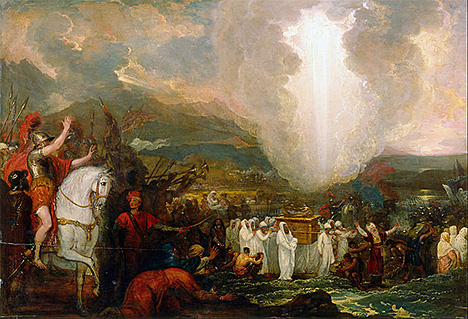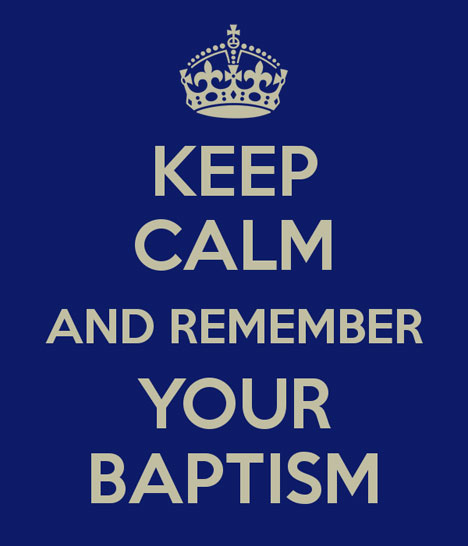Jul
21
2014

For seizing the devoted plunder of Jericho, Achan was stoned to death and burned with fire, along with his children, livestock, and all his possessions. This judgment appears to contradict Deuteronomy 24:16, which forbids the punishment of children for the sins of their fathers.
It seems that the solution is architectural. Here’s an excerpt from the forthcoming Sweet Counsel:
Continue reading
Comments Off | tags: Achan, Covenant curse, Covenant Theology, Joshua, Tabernacle, Ten Commandments | posted in Bible Matrix, Biblical Theology
Jul
18
2014

At that time the Lord said to Joshua,
“Make flint knives and circumcise
the sons of Israel a second time.”
(Joshua 5:2)
Was Israel disobedient in its failure to circumcise every male born in the wilderness? The Lord never chastised them for this. If this lapse in the practice of circumcision was in the plan of God, what was the purpose of that plan? The example which first comes to mind is the circumcision of the firstborn son of Moses in Exodus 4:24-26.
This post has been slain and resurrected for inclusion in my 2015 book of essays, Inquietude.
Continue reading
Comments Off | tags: Circumcision, Covenant Theology, Egypt, Exodus, Firstfruits, James B. Jordan, Jericho, Moses, Revelation, Sodom | posted in Bible Matrix, Biblical Theology, The Last Days, The Restoration Era
Jul
2
2014
Raising Cain

“Just as Circumcision made impossible a global corruption,
so paedobaptism makes impossible a global Gospel.”
Part 1 here.
With so many young people leaving the Church, it is no wonder that there is a push to renew an understanding of biblical Covenant. Giving our children a profound sense of their “Covenant identity” is a crucial means of re-establishing the Covenant framework which has been neglected. Unfortunately, those pushing for these things are going about it in entirely the wrong way, because they are re-establishing the wrong Covenant.
Continue reading
12 comments | tags: Abel, Abraham, Babel, Baptism, Cain, Circumcision, Covenant Theology, Genesis, Jonah | posted in Biblical Theology
Jun
28
2014

or Where Kenneth Gentry Is Wrong on the Revelation
Part 1 here.
I’ve been meaning to write this post since I wrote Part 1 (over two years ago). A friend’s recent question concerning Kenneth Gentry’s lectures on the Revelation encouraged me to bite the bullet and bust a gut and get it done. The question is this: Is the Revelation to be interpreted in the light of Josephus’ Jewish War, or in the light of the Bible itself?
Continue reading
6 comments | tags: AD70, Ark of the Covenant, Covenant curse, Covenant Theology, Deuteronomy, James B. Jordan, Kenneth Gentry, Leviticus, Literary Structure, Peter Leithart, Revelation, Revelation 20, Thessalonians | posted in Against Hyperpreterism, Bible Matrix, Biblical Theology, The Last Days
May
4
2014

or The Time Appointed by the Father
The Bible is a musical book. It plays the same tune over and over again. However, much of modern Bible scholarship refuses to be caught up in the flow, instead limiting its practice to the particulars. Instead of recognising themes and motifs, it boils down to ”Look, there’s another B flat.” The historical-grammatical method is an instrument which refuses to submit to the music for fear it might get carried away.
Peter Leithart follows the tune concerning the meaning of stoicheia. He has not only identified a B flat, but how it is used in the literary composition – its significance in the Covenant tune as it is presented to us by God, and as it plays out in history. I’ll quote his post, and then I will allow the same tune to carry him somewhere he does not want to go.
Continue reading
Comments Off | tags: Baptism, Covenant Theology, James Jordan, Peter Leithart | posted in Bible Matrix, Biblical Theology, Quotes
Mar
17
2014

“Modern commentators seem to overlook the promise of children in Genesis 1, and how these unmentioned ‘innocents,’ yet in Adam’s loins, are silent but crucial characters in Genesis 3.”
When Paul refers to Abraham as the father of all who believe, the one through whom all nations would be blessed (Romans 4:9-22), we must be prepared to interpret his inspired words through the lens of the House of God, the ever-present architecture of Eden.
The Name of the Father
God’s household in heaven was a tent of servants—the angels—but there was only one Son, through whom came all Creation. This means that the first verses of John’s Gospel, which describe the pre-incarnate Word, can tell us a great deal about God’s intentions for Adam, the incarnate image of God. All that Jesus was in heaven, Adam was to be on earth:
This post has been slain and resurrected for inclusion in my 2015 book of essays, Inquietude.
Continue reading
Comments Off | tags: Abraham, Covenant Theology, Feasts, Genesis, Literary Structure, Tabernacle | posted in Bible Matrix, Biblical Theology
Mar
10
2014

For as in those days before the flood they were eating and drinking, marrying and giving in marriage, until the day when Noah entered the ark, and they were unaware until the flood came and swept them all away, so will be the coming of the Son of Man. (Matthew 24:38-39)
Most disputes concerning the meaning of the Scriptures are not due to a lack of trying when it comes to hermeneutics. They result from a lack of due process. By this, I do not mean the process of interpretation but the identification in the Scriptures of the processes of God.
An example would be the meaning of Christ’s words concerning the unpardonable sin, which have terrified many Christians unnecessarily. Blasphemy against the Spirit is unpardonable not because it is the worst sin. It is unpardonable because it is the last sin.
This post has been slain and resurrected for inclusion in my 2015 book of essays, Inquietude.
Continue reading
2 comments | tags: AD70, Babylon, Covenant Theology, Genesis, Hebrews, Herod, Matthew, Matthew 24, Nebuchadnezzar, Noah, Numbers | posted in Bible Matrix, Biblical Theology, Christian Life, The Last Days
Mar
7
2014

“Truly, truly, I say to you, (Transcendence)
the Son can do nothing of his own accord, (Hierarchy)
but only what he sees the Father doing. (Ethics)
For whatever the Father does, (Oath/Sanctions)
that the Son does likewise.” (Succession)
(John 5:19)
The premise that the entire text of the Bible has a common structure, one which operates at multiple levels, has many implications. Besides the fact that this is clearly a miracle, there is the question of why such a limitation would be placed upon the Words of God.
This post has been slain and resurrected for inclusion in my 2015 book of essays, Inquietude.
Continue reading
5 comments | tags: Christopher Hitchens, Covenant Theology, Culture, Education, Ezekiel, James Jordan, John, Richard Dawkins | posted in Apologetics, Bible Matrix, Biblical Theology, Christian Life
Feb
22
2014

Many of the obscure and apparently obsolete details in the Torah are hints of events later in the Bible. Some of these details are not what is said but what is not said. And some of these unspoken hints are discernible only through identification of common structures. One example is a line missing from Genesis 1.
Continue reading
Comments Off | tags: Abraham, Covenant Theology, Fractals, Literary Structure, Moses | posted in Bible Matrix, Biblical Theology
Feb
22
2014

“The whole world is like a drunken peasant.
They fall off one side of the horse or the other.” – Martin Luther
An Apology to Joel McDurmon – In Both Senses of the Word
“As Christians, an exhortation to ‘remember your baptism’ is a good one, but this begins with a baptism you can actually remember.”
Joel McDurmon of American Vision just wrote a post tracing back to their Arminian doctrine the deceit and manipulative tactics use by, and even marketed by, the Elevation Church to increase their baptism quota. He writes:
If “saving souls” is the main end-game of your Christian faith, and if the free will is the last hurdle of salvation, then why would you not what the help of an army of marketers, managers, assembly lines, pre-packaged directions, techniques, tools, processes, and networks of support farms and professionals who can claim “billions served”?
It’s only from the standpoint of the doctrines of grace that it makes sense to criticize these manipulative tactics. It is encouraging that some Christians seem naturally uneasy when a church like Elevation admits what it does. But Elevation is just a mote. Free will theology is the plank.
Well, my nickname is Bully and I saw red. A discussion ensued on facebook which did not end on very good terms. Of course, this is something that rarely ever happens (not). I believe what I wrote was entirely objective, and at least as gracious as Mr McDurmon’s opinion piece, however re-reading it, it was badly worded and Joel, a writer whose work and ministry I admire, took it personally. I wrote:
Continue reading
4 comments | tags: Baptism, Covenant Theology, Ecclesiology, Joel McDurmon | posted in Biblical Theology, Christian Life



































